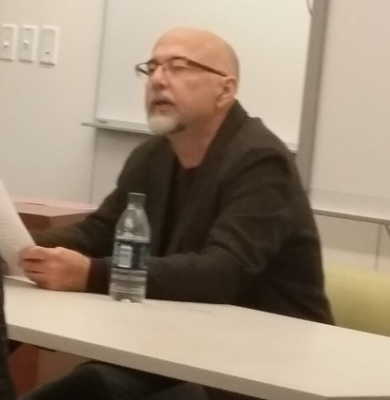 Professor of Spanish and Portuguese of University of California Berkeley Julio Ramos visited UConn on February 25th to deliver a talk titled “Literatura, droga, y estado: Los encadenados de Josefina Guevara,” dealing with the relationship between drug addiction and individual freedoms in Puerto Rico as glimpsed in the 1966 novel by author Josefina Guevara. Professor Ramos, who is both an influential writer of cultural criticism and an award-winning director of documentary films, provided a social-historical context for considering Guevara’s novel, describing the ways in which drug addiction in Puerto Rico in the 1960s and thereafter has been treated by State authorities as a criminal status, rather than as a mental health or medical issue. He explained that such a scenario robs addicted persons of their right to self-determination with regard to their options for treatment, and that it exemplifies the problematic relation of biopolitical control between the State and its subjects. Ramos further spoke about various approaches to drug commentary in literature, remarking on observed differences between the sensationalizing tendencies of narcoliterature and other literatures in which narcotics may paradoxically be viewed as both a subject’s route of escape as well as her ticket to State custody. All of this was discussed in terms of the broader economic and political situation of Puerto Rico as both a center of pharmaceutical production and as an Associated Free State of the United States – conditions which have had formative influence on the relations between State sovereignty and the Puerto Rican populace.
Professor of Spanish and Portuguese of University of California Berkeley Julio Ramos visited UConn on February 25th to deliver a talk titled “Literatura, droga, y estado: Los encadenados de Josefina Guevara,” dealing with the relationship between drug addiction and individual freedoms in Puerto Rico as glimpsed in the 1966 novel by author Josefina Guevara. Professor Ramos, who is both an influential writer of cultural criticism and an award-winning director of documentary films, provided a social-historical context for considering Guevara’s novel, describing the ways in which drug addiction in Puerto Rico in the 1960s and thereafter has been treated by State authorities as a criminal status, rather than as a mental health or medical issue. He explained that such a scenario robs addicted persons of their right to self-determination with regard to their options for treatment, and that it exemplifies the problematic relation of biopolitical control between the State and its subjects. Ramos further spoke about various approaches to drug commentary in literature, remarking on observed differences between the sensationalizing tendencies of narcoliterature and other literatures in which narcotics may paradoxically be viewed as both a subject’s route of escape as well as her ticket to State custody. All of this was discussed in terms of the broader economic and political situation of Puerto Rico as both a center of pharmaceutical production and as an Associated Free State of the United States – conditions which have had formative influence on the relations between State sovereignty and the Puerto Rican populace.